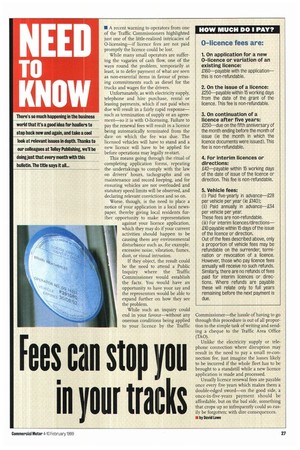Fees can stop you in your tracts
Page 29

If you've noticed an error in this article please click here to report it so we can fix it.
• A recent warning to operators from one of the Traffic Commissioners highlighted just one of the little-realised intricacies of 0-licensing—if licence fees are not paid promptly the licence could be lost.
While many small operators are suffering the vagaries of cash flow, one of the ways round the problem, temporarily at least, is to defer payment of what are seen as non-essential items in favour of pressing commitments such as diesel for the trucks and wages for the drivers.
Unfortunately, as with electricity supply, telephone and hire purchase, rental or leasing payments, which if not paid when due will result in a fairly rapid response— such as termination of supply or an agreement—so it is with 0-licensing. Failure to pay the renewal fees will result in a licence being automatically terminated from the date on which the fee was due. The licensed vehides will have to stand and a new licence will have to be applied for before operations may legally re-start.
This means going through the ritual of completing application forms, repeating the undertakings to comply with the law on drivers' hours, tachographs and on maintenance and record keeping, and for ensuring vehicles are not overloaded and statutory speed limits will be observed, and declaring relevant convictions and so on.
Worse, though, is the need to place a notice of your application in a local newspaper, thereby giving local residents further opportunity to make representation against your licence application, which they may do if your current activities should happen to be causing them any environmental disturbance such as, for example, excessive noise, vibration, fumes, dust, or visual intrusion.
If they object, the result could be the need to attend a Public Inquiry where the Traffic Commissioner would establish the facts. You would have an opportunity to have your say and the representors would be able to expand further on how they see the problem.
While such an inquiry could end in your favour—without any onerous conditions being applied to your licence by the Traffic
Commissioner—the hassle of having to go through this procedure is out of all proportion to the simple task of writing and sending a cheque to the Traffic Area Office (TAO).
Unlike the electricity supply or telephone connection where disruption may result in the need to pay a small re-connection fee, just imagine the losses likely to be incurred if the whole fleet has to be brought to a standstill while a new licence application is made and processed.
Usually licence renewal fees are payable once every five years which makes them a double-edged sword—on the good side, a once-in-five-years payment should be affordable, but on the bad side, something that crops up so infrequently could so easily be forgotten; with dire consequences.
• by David Lowe








































































































